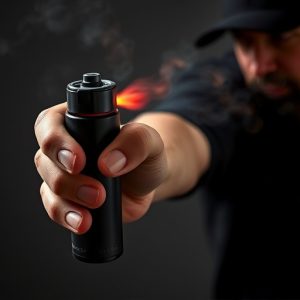Concentrated Capsicum Spray: Protection, Efficacy, and Legal Considerations for Emergency Situations
Concentrated capsicum spray (pepper spray) is a legal self-defence tool that temporarily incapacitat…….
Concentrated capsicum spray (pepper spray) is a legal self-defence tool that temporarily incapacitates targets by irritating eyes, nose, and respiratory systems. In case of an attack, immediate action includes moving to safety, rinsing affected areas with water, seeking fresh air, applying cold compresses, and staying hydrated. Medical attention should be sought if symptoms persist or worsen. Long-term effects may include eye irritation, respiratory distress, and skin reactions lasting up to 48 hours. In many jurisdictions, pepper spray is regulated for self-defence and emergency situations, with proper training and proportionate use guidelines essential before deployment.
“Concentrated capsicum spray, a powerful tool for personal protection, has gained attention for its ability to deter aggressive attacks. This article delves into the intricacies of this spray, exploring its composition and proven efficacy against potential threats. We provide a comprehensive guide on emergency treatment after a pepper spray attack, offering crucial steps to ensure immediate relief and recovery. Additionally, we discuss the long-term effects and legal considerations surrounding the use of concentrated capsicum spray, shedding light on its appropriate deployment in various scenarios.”
- Understanding Concentrated Capsicum Spray: Its Composition and Efficacy
- Emergency Treatment After a Pepper Spray Attack: Steps to Follow
- Long-Term Effects and Recovery: What to Expect Following Exposure
- Legal Implications and Use Cases: When is it Appropriate to Deploy Concentrated Capsicum Spray?
Understanding Concentrated Capsicum Spray: Its Composition and Efficacy
Concentrated capsicum spray, often referred to as pepper spray, is a powerful tool for self-defence and protection. Its primary active ingredient is capsaicin, the compound that gives chilli peppers their heat. This chemical irritates the eyes, nose, and respiratory system of the target, causing temporary disability and providing an opportunity for escape during an attack.
Beyond its immediate effects as an emergency treatment after a pepper spray attack, concentrated capsicum spray has proven efficacy in deterring potential assailants due to its intense sting and burning sensation. The spray’s composition includes various additives that enhance its range, potency, and durability, making it a reliable defence mechanism for individuals in high-risk situations.
Emergency Treatment After a Pepper Spray Attack: Steps to Follow
In the event of a pepper spray attack, immediate and proper emergency treatment is crucial to mitigate the effects of capsicum spray, which can cause severe discomfort and temporary blindness. If exposed, the first step is to move to a safe location away from the source of the spray to prevent further inhalation or contact with the skin. Remove any clothing or accessories that have been contaminated by the spray, being careful not to rub or wipe affected areas, as this can spread the irritant further. Rinse the eyes thoroughly with clean water for at least 15 minutes, ensuring you blink frequently to help irrigate the eye and reduce irritation. For inhalation, seek fresh air immediately; if breathing is difficult, use a face mask or scarf to protect your mouth and nose while moving to an area with cleaner air. Applying a cold compress to the affected skin can provide some relief from pain and burning sensations. It’s important to stay hydrated by drinking plenty of water, as pepper spray can lead to dehydration due to excessive sweating or vomiting.
Seek medical attention if symptoms persist or worsen, especially for individuals with pre-existing respiratory conditions. Over-the-counter pain relievers may help manage headaches or body aches caused by the spray. Wash any clothing that came into contact with the spray separately and launder them thoroughly afterward to prevent recontamination. While emergency treatment aims to alleviate immediate discomfort, it’s equally vital to be prepared for potential long-term effects, such as sensitivity to light or respiratory issues, which may require further medical care.
Long-Term Effects and Recovery: What to Expect Following Exposure
After a concentrated capsicum spray attack, it’s crucial to understand the potential long-term effects and recovery process. Exposure to pepper spray can cause various symptoms that may persist for several hours or even days. These include eye irritation, redness, stinging, and tears, as well as respiratory distress, coughing, and difficulty breathing. In some cases, individuals might experience skin irritation, rashes, or burning sensations where the spray made contact.
Emergency treatment after a pepper spray attack involves immediately rinsing the eyes with clean water for at least 15 minutes to dilute the irritant. If breathing is affected, moving to an area with fresh air and seeking medical attention if symptoms persist or worsen is essential. While most symptoms subside within 24-48 hours, severe cases may require prescription medications for eye or respiratory conditions. It’s important to monitor recovery progress and consult healthcare professionals for any lingering issues, as prompt emergency treatment can significantly alleviate long-term effects.
Legal Implications and Use Cases: When is it Appropriate to Deploy Concentrated Capsicum Spray?
In many jurisdictions, concentrated capsicum spray is a legal tool for self-defence and law enforcement, but its use comes with strict regulations. The appropriateness of deploying this spray depends on the specific circumstances and local laws. It is often considered a less-lethal option during situations where force may be required, such as in response to an attack or to subdue an aggressive individual. However, its usage must adhere to guidelines ensuring it’s only employed when necessary and proportionate to the threat.
Beyond self-defence scenarios, concentrated capsicum spray can be utilized by security personnel in high-risk environments, like prisons or secure facilities, for crowd control and to prevent escapes. In emergency situations, such as a pepper spray attack, this spray can facilitate emergency treatment by temporarily incapacitating the victim, allowing responders to provide aid more easily. Yet, it’s crucial to emphasize that proper training and understanding of its effects are essential before considering its deployment.
Concentrated capsicum spray, while a powerful tool for self-defense, should only be used as a last resort. Understanding its composition, efficacy, and legal implications is crucial for responsible deployment. In the event of an attack, prompt emergency treatment, including thorough flushing and medical attention, can significantly reduce long-term effects. Knowing when and how to use this spray can help protect individuals in high-risk situations, ensuring their safety and well-being.


